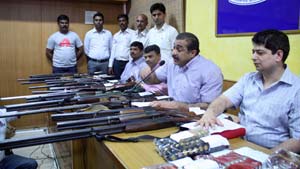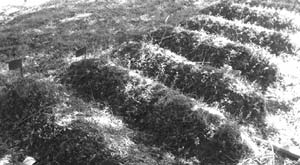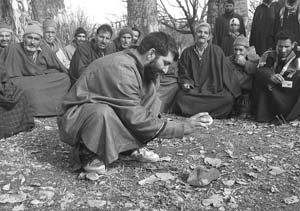Library CONTROVERSY
After revelations of various cases of land grabs in Kashmir Valley, another land grab issue has surfaced. This time the land has been shifted between two departments about a decade ago, from Education to Libraries where presently the construction of SPS Library was going on.
The Rs 34 crore SPS Library building constructed by the JKPCC in the city centre Lal Cowk on Moulana Azad Road was to be handed over to the Department of Libraries by end of this year for commissioning the SPS Library. But the police following the court orders, in the case of Ghulam Abbas Rather v/s Manzoor Ahmad Burza and Others, unlocked the under constructed building of Library and evicted the construction workers, staff and watch and ward of the JKPCC who were locked in by the petitioners.
JKPCC, fearing that their machinery worth crores might get damaged in by the petitioners, reported the issue to district development commissioner Srinagar and hence surfaced the issue.
The land to the SPS Library was transferred by the government a decade ago under order No. 150 – Edu (Tech) of 2003 dated 13-11-2003. The foundation stone was laid by then chief minister, Mufti Muhammad Sayeed. The government order reads, “Sanction is accorded to the transfer of land measuring 2 kanals from the College of Education Srinagar to the Director Libraries for proposed shifting, construction of SPS Library.”
The government through another order, QM No. HL/Plan-64/04/COE, dated 01-03-2005 transferred one kanal and 6 maralas of land of Higher Education Department from College of Education to the SPS library in 2005 for the construction of the building.
The SPS Central Library was established in 1898 and continued its function in an old building at Lal Mandi. The library building is maintaining a collection of 70,000 books including rare manuscripts and has been declared unsafe after the 2005 earthquake. But the whole collection is in a shambles because of the paucity of space.
Doda ACCIDENT
The Doda road once again proved to be a devil’s courtyard. This time, 9 people died and 13 others were injured in a tragic road mishap when a mini bus skidded off the Doda- Bhaderwah road near a sharp curve Sehnai, Doda and fell into a 100 meters deep george.
After the accident, the state government removed a traffic cop who was on duty that time but the main cause of the accidents always remains unattended, the condition of the road. Every time the officials say they will improve the road but what follows are the accidents after accidents and then condolences offered by state officials.
The Doda road has proved to be deadliest over years resulting in hundreds of deaths each year. Last year, in February 2012, 19 people died in an accident when a mini bus skidded off the road and fell into a more than 300 feet deep george and smashed into pieces.
While reacting to the recent accident Dr Jitendra Singh of BJP blamed the insensitive approach of the coalition government as a result of which such accidents have become a routine matter and more number of deaths are taking place because of road accidents now as compared to militancy related incidents. He also blamed the poor maintenance of the roads, particularly in hilly areas, and over speeding coupled with over loading of the public transport vehicles due to inefficiency of traffic police.
It is believed that most of the traffic police are wasted in their deployment for the smooth flow of the VIP vehicles, whereas the sensitive points of roads remain unmanned. Dr Singh further alleged that the presence of traffic police is more of cosmetic issuing random challans but not checking the irregularities which lead to accidents to such an extent.
GUARDS Arrested
It has always been a trend going outside state for studies or for a job and the people who move outside rarely return to valley then. But this time, some of them are likely to return. About 30,000 security guards from Jammu and Kashmir who were earning their livelihood in Maharashtra are going to lose their jobs. The Maharashtra police say their weapons are not registered with the concerned government.
The Maharashtra Police have already taken 22 guards into custody for keeping unregistered weapons. However, reports suggest that the guards have applied for registration and are awaiting clearance. More than 400 among these security guards have already left for their homes in Poonch, Rajouri and other districts of the state fearing reprisal from Maharashtra police.
The families of these security guards have approached MLA Poonch, Ajaz Jan who has rushed to Mumbai after learning about the plight of these people. Jan has since been camping in Mumbai and he has also arranged bail for all the 22 arrested persons.
MLA has also approached the chief minister Omar Abdullah for his help but as per reports Omar has suggested to meet the Maharashtra home minister and take up the issue with him. But due to scheduled holidays, Jan couldn’t meet the home minister.
It has been reported that after the incident was reported to various media outlets, the attitude of the agencies for which the guards had been working has changed as they are asking the guards to resign.
Jan who is leaving no stone unturned has now requested these organizations to allow the security guards to work as watchmen without weapons till their registration formalities are completed by the authorities in Mumbai. Meanwhile, families of these 30,000 people living in Poonch, Rajouri and other districts of the state have requested the chief minister to use his influence to ensure that they are not deprived of their livelihood.
More GRAVES
Two years after the discovery of more than 2000 corpses buried in north Kashmir, a nongovernmental organization (NGO) has claimed discovery of fresh unmarked graves from Chadoora tehsil of district Budgam.
The report by ‘Voice of Victims’ claimed that more than 60 unmarked graves have been identified in the central Kashmir areas and peripheries of city including Nowgam, Wanabal, Shankerpora, Kenihama Chokpora, Kanipora Chokpora, Wagoora, Humhama and Pahroo.
The report also claims that some graves were found in areas close to locales of Srinagar including Barzulla and Channapora. The NGO says that they have undertaken a survey in December and have proper proof of what they have reported in their report which was recently released.
“Although it is difficult to tell who are buried in these unmarked graves but one thing is certain—they were not air dropped. They are Kashmiris,” said the coordinator of the NGO.
“We need support of all those people who have lost their dear ones. We believe that many of the forced disappeared persons have been killed by forces here,” he said.
Two years ago, the State Human Rights Commission found more than 2,000 corpses buried in several unmarked graves in Kashmir. The graves were found in dozens of villages near the Line of Control. “Almost 2,156 unidentified dead bodies are buried in unmarked graves at 38 places in north Kashmir,” the inquiry report by the J&K State Human Rights Commission had revealed.
Police ACT
In turmoil hit Kashmir where the role of police is often debated during three decades of armed militancy is finally going to get a new Police Act.
After over 150 years, Jammu and Kashmir is all set to get a new Police Act as the state government has finalized the draft legislation for “wider public consultation.”
The government has draft legislation of the Act public for debate after discussing its contours for more than a year to make the legislation “more humane and acceptable to the people.”
New police act to be called as “Jammu and Kashmir Police (Amendment) Act, 2013.”
“We are done with the exercise of drafting the new act,” said Nasir Aslam Wani, the Minister of State for Home. “The act is ready and will soon be put on the website of police department for public debate and feedback.”
According to an official, the reason for making the new police act public though website is to generate wider public debate to find “shortcomings or loopholes, if any” therein. “Public involvement is must as the act is for them. The government needs to know whether people would accept the new act or not. Genuine changes that people would suggest will seriously be considered,” the official said.
The draft legislation is likely to be put on the website in next 10 days. It will remain there for a while. After that, the act will be tabled before the State Cabinet for its consent.
After that, the act will be introduced in the State Assembly for discussion and passage.
According to reports the act will be moved in the upcoming budget session to be held in Jammu in February.
Death of a STAMP
Reyaz Ahmed is a humorous sarpanch. This 33-year-old Panchayat Raj representative of Reban village in Sopore has not even attended high school but he speaks fluent English. Before winning the 2011 sarpanch elections, no one knew Reyaz in his village.
Scared for his life after the killing of a 70-year-old panch, Habibullah Mir, he gathered all the villagers from his area and told them, in polite tune, that he was resigning since it did not serve any purpose in being a Sarpanch. While doing so, he told the villagers to make a circle and set himself in middle. He grabbed a stone and smashed his sarpanch stamp in front of them. Every one in the crowd; from a 10-year-old boy to a 70 –year-old-aged man, broke into laughter.
He announced that he didn’t need to submit his resignation in front of Block Development Officer (BDO). While going to the town, militants might kill him. So he was doing it here, in front of the villagers, to make it clear he was disassociating himself from the local bodies.
He further impressed upon the villagers that whosoever used to visit his home for stamping their papers should not do so in future as keeping a sarpanch’s stamp meant inviting danger.
The plastic and rubber stamp, blue in color, was broken into pieces when Reyaz smashed it with a stone. ‘This,’ Reyaz cried at the villagers, ‘is the real Malkul Maut (Angel of Death). So I am breaking it into pieces’.
“This is also the death of so-called grassroot democracy,” he said, while addressing the people. “It also shows who rules the entire Sopore”
The ‘over priced stamp’ had made Reyaz a famous man. He would put stamp on everything and anything whenever people came to him after he was elected as sarpanch.
“On Sept 10, when Ghulam Mohammad Yatoo, sarpanch of Raipora village in Palhalan, was killed, we thought of resigning. He was one of the famous sarpanchs in entire north Kashmir who was known for his good work and honesty. When he was killed, then only I realized that they would not spare us.”
From April to June in 2011, a staggering 79 per cent of Jammu and Kashmir’s 5.07 million registered voters had participated in the Panchayat elections. The 17-phase election saw the birth of 4,130 sarpanchs and 29,719 panches. Reyaz was one among those who was elected and given this prized stamp.
Sameer Yasir















